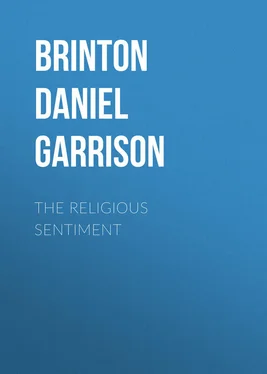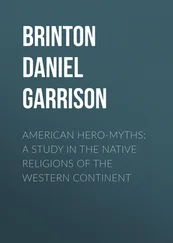Daniel Brinton - The Religious Sentiment
Здесь есть возможность читать онлайн «Daniel Brinton - The Religious Sentiment» — ознакомительный отрывок электронной книги совершенно бесплатно, а после прочтения отрывка купить полную версию. В некоторых случаях можно слушать аудио, скачать через торрент в формате fb2 и присутствует краткое содержание. ISBN: , Жанр: foreign_antique, foreign_prose, на английском языке. Описание произведения, (предисловие) а так же отзывы посетителей доступны на портале библиотеки ЛибКат.
- Название:The Religious Sentiment
- Автор:
- Жанр:
- Год:неизвестен
- ISBN:http://www.gutenberg.org/ebooks/30061
- Рейтинг книги:3 / 5. Голосов: 1
-
Избранное:Добавить в избранное
- Отзывы:
-
Ваша оценка:
- 60
- 1
- 2
- 3
- 4
- 5
The Religious Sentiment: краткое содержание, описание и аннотация
Предлагаем к чтению аннотацию, описание, краткое содержание или предисловие (зависит от того, что написал сам автор книги «The Religious Sentiment»). Если вы не нашли необходимую информацию о книге — напишите в комментариях, мы постараемся отыскать её.
The Religious Sentiment — читать онлайн ознакомительный отрывок
Ниже представлен текст книги, разбитый по страницам. Система сохранения места последней прочитанной страницы, позволяет с удобством читать онлайн бесплатно книгу «The Religious Sentiment», без необходимости каждый раз заново искать на чём Вы остановились. Поставьте закладку, и сможете в любой момент перейти на страницу, на которой закончили чтение.
Интервал:
Закладка:
While he expressly acknowledged the divine conception of Jesus, he denied the coarse and literal version of that doctrine in vogue among the ignorant Christians around him. Enlightened christendom, to-day, does not, I believe, differ from him on this point.
Such sexual religions do not arise, as the theory has hitherto been, from study and observation of the generative agencies in nature, but from the identity of object between love in sense and love in intellect, profane and sacred passion. The essence of each is continuance , preservation; the origin of each is subjective, personal; but the former has its root in sensation, the latter in reason.
The sex-difference in organisms, the “abhorrence of self-fertilization” which Mr. Darwin speaks of as so conspicuous and inexplicable a phenomenon, is but one example of the sway of a law which as action and reaction, thesis and antithesis, is common to both elementary motion and thought. The fertile and profound fancy of Greece delighted to prefigure this truth in significant symbols and myths. Love, Eros, is shown carrying the globe, or wielding the club of Hercules; he is the unknown spouse of Psyche, the soul; and from the primitive chaos he brings forth the ordered world, the Kosmos.
The intimate and strange relation between sensuality and religion, so often commented upon and denied, again proven, and always misinterpreted, thus receives a satisfactory explanation. Some singular manifestations of it, of significance in religious history, are presented by the records of insane delusions. They confirm what I have above urged, that the association is not one derived from observation through intellectual processes, but is a consequence of physiological connections, of identity of aim in the distinct realms of thought and emotion.
That eminent writer on mental diseases, Schroeder van der Kolk, when speaking of the forms of melancholy which arise from physical conditions, remarks: “The patient who is melancholy from disorders of the generative organs considers himself sinful. His depressed tone of mind passes over into religious melancholy; ‘he is forsaken by God; he is lost.’ All his afflictions have a religious color.” In a similar strain, Feuchtersleben says: “In the female sex especially, the erotic delusion, unknown to the patient herself, often assumes the color of the religious.” 47 47 Elements of Medical Psychology , p. 281.
“The unaccomplished sexual designs of nature,” observes a later author speaking of the effects of the single life, “lead to brooding over supposed miseries which suggest devotion and religious exercise as the nepenthe to soothe the morbid longings.” 48 48 J. Thompson Dickson, The Science and Practice of Medicine in relation to Mind , p. 383 (New York, 1874).
Конец ознакомительного фрагмента.
Текст предоставлен ООО «ЛитРес».
Прочитайте эту книгу целиком, купив полную легальную версию на ЛитРес.
Безопасно оплатить книгу можно банковской картой Visa, MasterCard, Maestro, со счета мобильного телефона, с платежного терминала, в салоне МТС или Связной, через PayPal, WebMoney, Яндекс.Деньги, QIWI Кошелек, бонусными картами или другим удобным Вам способом.
1
In his essay entitled, Ueber den Geschlechtsunterschied und dessen Einfluss auf die organische Natur , first published in 1795.
2
“Der alte Dualismus von Geist und Körper, der Jahrhunderte hindurch nach Versöhnung gerungen, findet diese heute nicht zwar in der Einheit der Substanz, wohl aber in der Einheit des Gesetzes.” Dr. Heinrich Boehmer, Geschichte der Entwickelung der Naturwissenschaftlichen Weltanschauung in Deutschland , s. 201 (Gotha, 1872).
3
Elements of Physio-Philosophy , § 3589. Eng. trans., London, 1847.
4
Von Feuchtersleben, The Principles of Medical Psychology , p. 130 (Eng. trans., London, 1847).
5
“The fundamental property of organic structure is to seek what is beneficial, and to shun what is hurtful to it.” Dr. Henry Maudsley, Body and Mind , p. 22.
“The most essential nature of a sentient being is to move to pleasure and from pain.” A. Bain, On the Study of Character , p. 292 (London, 1861).
“States of Pleasure are connected with an increase, states of Pain with an abatement of some or all of the vital functions.” A. Bain, Mind and Body , p. 59.
“Affectus est confusa idea, quâ Mens majorem, vel minorem sui corporis, vel alicujus ejus partis, existendi vim affirmat.” Spinoza, Ethices , Lib. III. ad finem .
6
The extension of the mechanical laws of motion to organic motion was, I believe, first carried out by Comte. His biological form of the first law is as follows: “Tout état, statique ou dynamique, tend à persister spontanément, sans aucune altération, en resistant aux perturbations extérieures.” Système de Politique Positive , Tome iv. p. 178. The metaphysical ground of this law has, I think, been very well shown by Schopenhauer to be in the Kantian principle that time is not a force, nor a quality of matter, but a condition of perception, and hence it can exert no physical influence. See Schopenhauer, Parerga und Paralipomena , Bd. II, s. 37.
7
“Aller Genuss, seiner Natur nach, ist negativ, d. h., in Befreiung von einer Noth oder Pein besteht.” Parerga und Paralipomena. Bd. II, s. 482.
8
“No impression whatever is pleasant beyond the instant of its realization; since, at that very instant, commences the change of susceptibility, which suggests the desire for a change of impression or for a renewal of that impression which is fading away.” Dr. J. P. Catlow, The Principles of Aesthetic Medicine , p. 155 (London, 1867).
“Dum re, quem appetamus fruimur, corpus ex ea fruitione novam acquirat constitutionem, á quá aliter determinatur, et aliæ rerum imagines in eo excitantur,” etc. Spinoza, Ethices , Pars III, Prop. lix.
9
“Feeling and thought are much more real than anything else; they are the only things which we directly know to be real.” – John Stuart Mill. — Theism , p. 202. How very remote external objects are from what we take them to be, is constantly shown in physiological studies. As Helmholtz remarks: “No kind and no degree of similarity exists between the quality of a sensation, and the quality of the agent inducing it and portrayed by it.” — Lectures on Scientific Subjects , p. 390.
10
The Philosophy of Consciousness , p. 72.
11
The Gospel of John (ch. xviii.) leaves the impression that Pilate either did not wait for an answer but asked the question in contempt, as Bacon understood, or else that waiting he received no answer. The Gospel of Nicodemus, however, written according to Tischendorf in the second century, probably from tradition, gives the rest of the conversation as follows: “Pilate says to him: What is truth? Jesus says: Truth is from heaven. Pilate says: Is not there truth upon earth? Jesus says to Pilate: See how one who speaks truth is judged by those who have power upon earth!” [ch. iii.]
Читать дальшеИнтервал:
Закладка:
Похожие книги на «The Religious Sentiment»
Представляем Вашему вниманию похожие книги на «The Religious Sentiment» списком для выбора. Мы отобрали схожую по названию и смыслу литературу в надежде предоставить читателям больше вариантов отыскать новые, интересные, ещё непрочитанные произведения.
Обсуждение, отзывы о книге «The Religious Sentiment» и просто собственные мнения читателей. Оставьте ваши комментарии, напишите, что Вы думаете о произведении, его смысле или главных героях. Укажите что конкретно понравилось, а что нет, и почему Вы так считаете.












